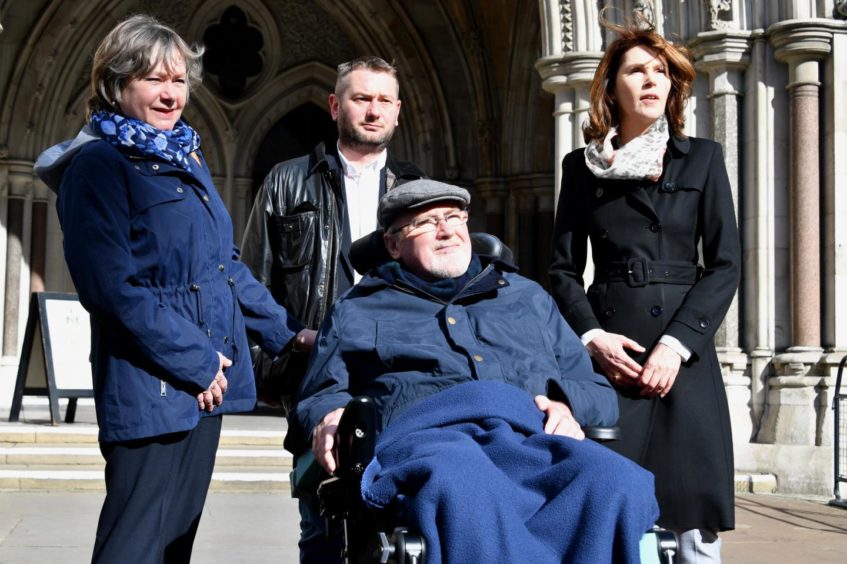Laws on euthanasia (also known as assisted dying or assisted suicide) differ across the world, and whether or not those who are terminally ill should be allowed to decide to end their life early is a commonly heated topic of debate.
Here, two campaigners on opposite sides of the argument present their views for or against assisted dying being made legal in Scotland.
For – ‘We will look back and wonder why we let suffering go on for so long’
The Scottish Parliament will this term look again at legalising assisted dying, and rightly so. The ban causes heartache and injustice for so many dying people and their families across Scotland.
If you are terminally ill and facing a bad death then among your limited choices is the option to find around £10,000 and attempt to go to Switzerland. You may not be considered fit enough to travel.
You could look at ways to end your own life at home when things become unbearable, or you could starve yourself to death, or you could continue to suffer, which many do, even with the best care.
The real faces behind the campaign
Our recent Dignity in Dying Scotland campaign told the stories of:
Paula, whose mum was dying of brain cancer in such a traumatic way that she considered Dignitas and thought of ending her own life in a hotel room alone, so as not to implicate any family members in her death.
Josh, whose grandmother had cancer and endured the agony of starvation and dehydration for 13 long days until she died.
Tracy, who has terminal cancer and is considering how to end her own life in the least upsetting way for her loved ones if things get too bad.
Chris, who recently had throat cancer successfully treated but knows if it returns that he needs peace of mind about a good death.
Sarah, Victoria and Zoe, who watched their mum Heather die in unspeakable pain and anguish beyond the reach of palliative care.
None of these people wanted to have to tell these very personal experiences; they did it so that no one else has to suffer like this again. They are the collateral damage of an unjust and outdated law. We must listen to what they are saying.
Not everyone agrees – and that’s OK
The law that will go before parliament is one that coexists with more and better palliative care and applies only to terminally ill, mentally competent adults. We will look back and wonder why we let this suffering go on for so long when there is another, better way.
They will say that it is not safe, but assisted dying legislation brings safety and transparency where there is currently none; it has safeguards built in upfront
Emerging from the pandemic, there has never been a better time for reform – for our parliament to pass pragmatic and compassiona te laws for the people who really need them.
Not everyone agrees with assisted dying, and that’s OK. They don’t need to use it. But they shouldn’t stand in the way of others who need it. Our opponents will try to induce fear based on unfounded hypothetical arguments, rather than dealing with the reality of the current law.
They will say that it is not safe, but assisted dying legislation brings safety and transparency where there is currently none; it has safeguards built in upfront. They will say it is too complex, but “complex” is someone trying to find the money and make plans to go to Switzerland in secret. It is someone spending their final weeks working out how to end their own life with the most certainty and least mess. It is watching someone you love in agony when there is no hope.
There is a better way, and it is right that the Scottish Parliament acts soon. Our dying citizens cannot wait.
Alyson Thomson is the Director of Dignity in Dying Scotland
Against – ‘Legalising assisted dying undermines Scotland’s fight against suicide’
New guidance on preventing suicide was issued to every local authority in Scotland last month in a bid to harmonise the approach taken in different council areas. It is a hugely welcome initiative. Figures show that 833 people died of suicide in Scotland in 2019 – an average of two people every single day. These figures are distressing. A clear and consistent approach to suicide prevention will aid health providers, police officers and others in bringing them down.
Every suicide is an immense tragedy that affects family members and loved ones of the deceased for the rest of their lives. It is something that we should all want to see eradicated from Scottish society. No person should be allowed to feel so utterly helpless that ending their life seems like the only way out.
No death by suicide should ever be considered inevitable
The National Suicide Prevention Leadership Group (NSPLG), which authored the guidance, is clear that we all have a role to play.
Scotland’s compassionate approach to suicide and those affected by it seems wholly at odds with calls for assisted suicide
It states: “Our vision is of a Scotland where suicide is preventable, where help and support is available to anyone who is contemplating suicide and to those who have lost a loved one to suicide. No death by suicide should ever be considered inevitable.
“We believe suicide prevention is everyone’s business and the launch of this guidance will help to support local communities who have such an important role in keeping people safe from suicide.”
This compassionate approach to suicide and those affected by it seems wholly at odds with calls for assisted suicide – or as it is euphemistically termed “assisted dying” – in Scotland.
There is a growing push for legislation to allow terminally ill people to access state-sponsored suicide. Campaign group Dignity in Dying, formerly known as the Voluntary Euthanasia Society, has called for legislation in the next parliament and is seeking to make the subject an election issue.
There is always hope
Proponents of assisted dying would say the two issues are separate, but are they? With both suicide and assisted suicide, we are talking about vulnerable people who are experiencing pain and distress – either mental, physical or emotional – and seeking to bring about an end to their lives. The assumption in both scenarios is that some situations are utterly hopeless and that death is the only solution.
As a society, we should reject this impulse. People do face desperately hard situations in life, whether it is acute mental anguish, terminal illness or non-terminal conditions that take away a person’s faculties. But there is always hope.
In medical terms, there is no condition that cannot be alleviated through proper palliative care. And there are brilliant charities that provide support to the suffering, whether it is monetary, psychological, or just through coming alongside people in their situations to help them find meaning and purpose.
In jurisdictions that have legalised assisted dying or euthanasia, there is evidence of a rise in suicide more widely. A 2015 study from the United States found that making it legal for doctors to assist someone to end their life resulted in a 6.3% increase in total suicides. The report’s authors concluded that changing the law was associated with “an increased inclination to suicide in others”. This implies that changing the law to allow assisted dying has engendered a culture change. Suicide is now viewed as more acceptable.
Suicide should not be seen as acceptable in certain instances for certain people
If professionals in Scotland are presently working hard to raise awareness about suicide, identify those at risk and encourage them down a different path, their efforts will surely be undermined by legislation stating that suicide is acceptable in certain instances, for certain people. Even if safeguards are proposed to limit the scope of an assisted dying law, the wider effects in society will be far less controllable.
Over the last 12 months, we have all made sacrifices in order to limit the spread of coronavirus and protect the vulnerable in society. This communicates something vitally important: a respect for and cherishing of human life.
We strive to protect life in many ways – through medicine, through policing, through neo-natal care. Legalising assisted suicide would undermine this ethic.
When it comes to suicide, we must continue to view the ending of a human life as a profound tragedy. This means opposing any move to put assisted suicide on the statute book.
Jamie Gillies works for Christian campaign charity CARE for Scotland, and is a political commentator and campaigner
If you are struggling with your mental health, there is help available.
If you need to talk, the Samaritans helpline is 116 123. It is open 24 hours, seven days a week. Calls can be made at any time, from any phone. All calls are confidential.
If your life is in immediate danger and you need an ambulance, call 999.





